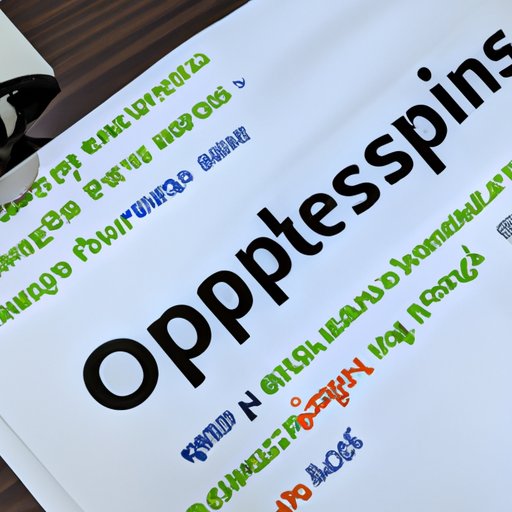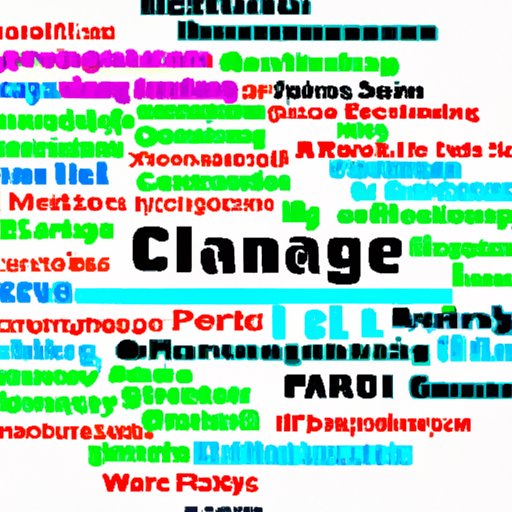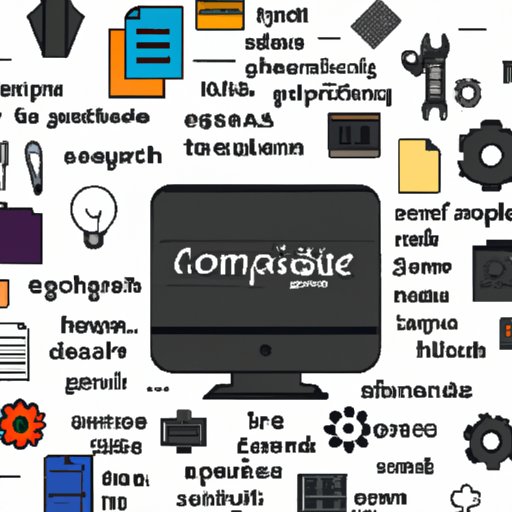Introduction
Programming is the process of creating instructions for a computer to follow in order to execute a specific task or solve a problem. It involves writing code in a specific programming language that can be understood and interpreted by the computer. Learning to program on a computer can open up many opportunities, from increased employability to improved problem-solving skills.
Step-by-Step Guide to Programming on a Computer
The following is a step-by-step guide to getting started with programming on a computer:
Choosing the Right Programming Language
The first step to learning how to program on a computer is to choose the right programming language. There are many different languages available, each with its own advantages and disadvantages. Popular choices include C/C++, Java, Python, and JavaScript.
Understanding the Basics of Programming
Once you have chosen a programming language, it is important to understand the basics of programming. This includes understanding data types, variables, functions, loops, and conditionals. It is also helpful to learn the syntax and structure of the language you will be using.
Installing Development Environment and Tools
The next step is to install a development environment and any necessary tools. The development environment is a software application that provides an integrated development interface for writing, debugging, and running programs. Common tools include text editors, compilers, debuggers, and interpreters.
Writing Your First Program
Once the development environment and tools are installed, you can start writing your first program. To do this, you must create a text file with the appropriate file extension for the language you are using. For example, if you are using Java, the file should have a .java extension. After writing the code, you must compile it and then run it to see if it works as expected.

Tips for Troubleshooting Common Programming Errors
When programming, it is common to make mistakes. These mistakes can lead to errors, which can be difficult to debug. Here are some tips for troubleshooting common programming errors:
Understanding Error Messages
When an error occurs, the computer will display an error message. It is important to read and understand the error message, as it can provide valuable information about what went wrong. Additionally, some error messages may contain suggestions on how to fix the problem.
Debugging Techniques
Debugging techniques can help identify and fix programming errors. These techniques include adding print statements to track the flow of the program, using a debugger to step through the code line by line, and testing small chunks of code at a time.
Resources for Help
If you are having difficulty troubleshooting an error, there are many resources available to help. These include online tutorials, books and eBooks, video tutorials, and forums where experienced programmers can provide assistance.

Exploring Open Source Programming Tools
Open source programming tools are freely available and can be used to create powerful applications. Popular open source platforms such as Linux, Apache, and MySQL are widely used for web development. Additionally, there are many open source libraries and frameworks available for various programming languages.
Popular Open Source Platforms
Popular open source platforms include Linux, Apache, and MySQL. These platforms provide the infrastructure needed to develop web applications. Additionally, they offer a wide range of features and tools to help developers create powerful applications.
Finding and Downloading Resources
Once you have chosen an open source platform, you can find and download the necessary resources. This includes libraries, frameworks, and other tools. Additionally, there are many online tutorials and forums available to help you get started.

Overview of Popular Programming Languages
There are many popular programming languages that can be used to develop applications. These include C/C++, Java, Python, and JavaScript. Each language has its own advantages and disadvantages, so it is important to choose the one that best suits your needs.
C/C++
C/C++ is a general-purpose programming language that is widely used for developing desktop applications. It is fast, powerful, and efficient, but can be difficult to learn due to its complex syntax and structure.
Java
Java is a cross-platform language that is used to develop enterprise applications. It is easy to learn, offers a wide range of features, and is highly secure. Additionally, it is compatible with almost all operating systems.
Python
Python is a high-level programming language that is used to develop web applications. It is easy to learn, offers a wide range of features, and is highly scalable. Additionally, it has a large community of users who can provide support.
JavaScript
JavaScript is a scripting language that is used to create interactive web pages. It is easy to learn, offers a wide range of features, and is supported by most web browsers. Additionally, it is becoming increasingly popular for developing mobile applications.
Benefits of Learning to Program on a Computer
Learning to program on a computer can bring many benefits, including increased employability, improved problem-solving skills, and the ability to create useful applications. According to a study by the National Center for Education Statistics, “Employers across nearly all industries have reported that applicants with programming skills are more likely to be hired than those without them.”
Increased Employability
Having programming skills can increase your employability, as employers in almost all industries are looking for applicants with these skills. Additionally, programming skills can help you stand out among other applicants and give you an edge when applying for jobs.
Improved Problem-Solving Skills
Programming can also improve your problem-solving skills. As you write code, you must think logically and use creative solutions to solve problems. This can help you become a better problem solver in other areas of life.
Ability to Create Useful Applications
Finally, learning to program on a computer can give you the ability to create useful applications. This can be anything from a simple game to a complex web application. With the right skills, you can turn your ideas into reality.
Programming Resources to Help You Get Started
If you are just starting out with programming, there are many resources available to help you get started. These include online tutorials, books and eBooks, and video tutorials.
Online Tutorials
Online tutorials are a great way to learn the basics of programming. They can provide step-by-step instructions on how to write code and debug errors. Additionally, many tutorials include sample code that you can use to practice.
Books and eBooks
Books and eBooks are another great resource for learning to program. They can provide detailed explanations of programming concepts and offer advice on how to solve common problems. Additionally, some books include exercises and sample code that you can use to practice.
Video Tutorials
Video tutorials are another great resource for learning to program. They can provide visual demonstrations of how to write code and debug errors. Additionally, some videos include live coding sessions that can help you get a better understanding of the language.
Conclusion
Learning to program on a computer can open up many opportunities, from increased employability to improved problem-solving skills. There are many resources available to help you get started, including online tutorials, books and eBooks, and video tutorials. With the right skills and dedication, anyone can learn how to program on a computer.
(Note: Is this article not meeting your expectations? Do you have knowledge or insights to share? Unlock new opportunities and expand your reach by joining our authors team. Click Registration to join us and share your expertise with our readers.)
